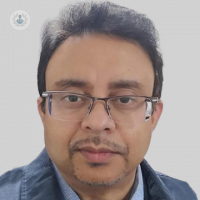Occipital neuralgia: how to treat a tension headache
Written by:Occipital neuralgia is a tension headache that begins in the back of the neck or head and spreads to the area behind the eyes, forehead and to the scalp. Here, Dr Rajib Samanta, an esteemed consultant paediatric neurologist, explains more.

What is occipital neuralgia?
The occipital nerves are a pair of nerves beginning near the second and third vertebrae in the neck and travel up to the eyes.
There is one nerve on either side of the head and they travel through the muscles at the back of the neck into the scalp towards the forehead, but not as far as the face or ears. Occipital neuralgia pain develops when these nerves are irritated or injured. Sensitivity can develop anywhere along the route of the nerves.
What can cause the condition?
Occipital neuralgia is a syndrome associated with headache, which could be primary or secondary. Many cases of occipital neuralgia have an unknown cause but some can be linked to:
- Osteoarthritis of the upper cervical spine
- Trauma, such as whiplash from a car accident
- Degenerative spinal compression of the upper cervical nerve roots
- Cervical nerve tumours
- Cervical disc disease
- Blood vessel inflammation
- Infection
What are the symptoms of occipital neuralgia?
The range in severity of pain can vary depending on the individual case. Symptoms of occipital neuralgia can include:
- Feelings of aching, burning and throbbing
- Intermittent shooting pain
- Migraine-like pain - although it is a different condition
- Cluster headaches
- Pain behind the eye
- Pain often on one side but it can affect both eyes
- The scalp can be tender to touch
How can it be treated at home?
At home, you can use a warm compress and massage the area to alleviate pain. Anti-inflammatory medications can be taken. Physiotherapy can also help ease symptoms.
What are other treatment options?
Your specialist may recommend nerve blockers, which are nerve-blocking injections that can both diagnose and treat the condition.
What are the surgical options?
When the pain is chronic and has not responded to the non-surgical options, then surgery is considered. Your neurosurgeon can discuss either of these options:
- Microvascular decompression - which releases the pressure on a nerve caused by a blood vessel.
- Occipital nerve stimulation - where a neurostimulator delivers electrical impulses to affected nerves to block transmission of pain messages to the brain.
If you would like to discuss your treatment options for occipital neuralgia, you can book an appointment to see Dr Rajib Samanta by visiting his Top Doctors profile.


